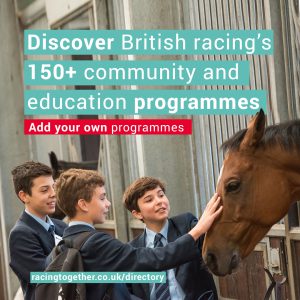
Fran Compostella grew up seeing first-hand the reliance of people on equines. No odds were offered on her chosen career being that of a vet and her globetrotting career experience and knowledge is now at the disposal of racing through her role with the Horse Welfare Board.
This week we revisit Fran Compostella’s blog following her talk at the Horseracing Industry Conference at Newbury Racecourse on 30 June. Fran highlighted progress so far on the Horse Welfare Board’s objectives.
Horses have taken me around the world and given me opportunities in life I could never have dreamed of. And in my opinion – that is exactly what they do for us humans.
I grew up in Mozambique where my parents worked as medical volunteers. That was where I first fell in love with equines. People in developing countries rely on equines for everything – they carry water and food to villages, children to school, sick people to hospitals… and they even generate electricity by powering machinery!
As a child I would witness my parents caring for humans, while nobody seemed to care for the animals they relied on so heavily – the invisible workers. That’s how I decided early on that I would be a vet.
There was also an ulterior motive to becoming a vet. During those years the civil war was active in Mozambique, and the country was riddled with land mines. One of the few safe spaces for children to play on, was a huge, fenced in, former colonial riding centre. I remember it like a little oasis for animals and children to roam free. The biggest risk while in there, were escapees from the neighbouring zoo (from which a lion and rhino did occasionally sneak out… so if you meet me and I say ‘if you see me run it’s probably cos there’s a lion behind me…’ I’m being serious!).
As part of its original remit, the facilities still housed some horses. These were mostly ex-racehorses imported from neighbouring South Africa, which gave me my first taste at looking after a Thoroughbred. Needless to say, my young mind soon realised that if I was to convince my parents that I could self-sufficiently afford owning horses, I had to become either rich and famous, or more realistically – a vet!
Out of Africa
My world journey began as I left Africa to return to Europe for my Veterinary Studies. Despite my terrible Italian (turns out a nationality and passport doesn’t automatically award you the right of parlance of a language!), I managed to pass the selection exams and get a place in the Veterinary University of Padua (Italy). During those five years, I absorbed every bit of knowledge I could, working after lecture hours as an unpaid assistant to any and all of the University Equine vets. Near the end of my studies, I won a scholarship at Iowa State University, where I trained in equine surgery for a year. It was my first experience at living in a caravan on an inflatable mattress, often stealing my colleague’s Weimaraner to use as a “water bottle” under the duvet. It appears that African raised children do not adapt easily to the -27c that Iowa offers in winter!
Horse accents never a problem
From there my passion for surgery was ignited and I decided to pursue a surgical residency. Going from an Internship in Edinburgh, to a clinical training period on the Curragh in Ireland, and finally a three-year surgical training at Bristol University with visits to Cornell (USA). Aside from learning everything there was to know about a horse, I also learnt that there are 101 ways of speaking English… a lesson learnt from misunderstanding ‘a wee bit’ of something up in Scotland, to desperately x-raying racehorses every time yard staff in Ireland would ask me ‘what’s the crack’?
From there, horses took me to Australia (to the Melbourne Cup), to living in Kentucky and visiting most of the towns hosting sales in the United States, to speaking at conferences across the world. Thanks to my connection with horses, I visited some of the most remote and incredible parts of the world – such as the Danakil depression in Ethiopia, Petra in Jordan, the forests of Myanmar and the Great wall of China.





As well as caring for them as their doctor, I have always owned and ridden horses.
A life well lived
Today I am working within the programme board team of the Horse Welfare Board. I specifically lead the Aftercare work – a fundamental pillar of the Horse Racing Welfare Strategy of 2020. The work is delivered in partnership with industry stakeholders, the RoR charity as well as external partners (such as World Horse Welfare). As a team, we work to help Thoroughbreds’ transition into public homes, where they can find their forever families. In doing so, these incredible animals continue to contribute in multiple ways. From providing support for communities (by helping children from disadvantaged backgrounds or learning difficulties) to promoting the sport with their diverse athletic abilities! Only recently, I attended the RoR Awards evening and listened to the incredible stories of how Thoroughbreds changed people’s lives. It struck me that maybe angels don’t need to have wings. Maybe all they need to have is hooves!




